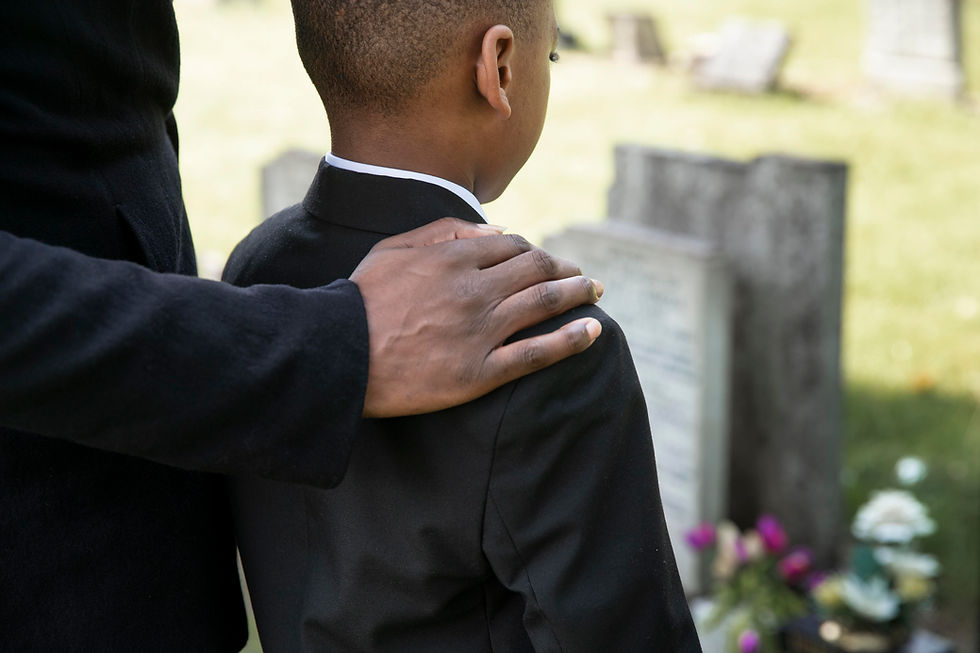Understanding Grief: Types, Emotions, and the Role of Therapy in Healing
- David Rust

- Jul 24
- 3 min read
Grief is one of the most universal—yet deeply personal—human experiences. It doesn’t follow a straight path. It ebbs, flows, and often shows up when we least expect it. Depending on the nature of the loss, cultural background, and personal history, grief can look—and feel—completely different from one person to another.

As therapists at Rust Wellness Group, we understand that grief is more than sadness. It’s an emotional landscape shaped by love, loss, confusion, and resilience. By recognizing the different types of grief, you can begin to make sense of your experience—and find compassionate, evidence-based support to help you heal.
1. Anticipatory Grief
Anticipatory grief happens before a loss—often when a loved one is facing a terminal illness. You may feel sadness, fear, or even guilt for mourning someone who is still alive. This form of grief can be incredibly isolating, especially when others don’t understand what you’re going through.
Therapy Tip: Mindfulness-Based Stress Reduction (MBSR) can help individuals stay grounded, manage anxiety, and find space to acknowledge their emotions. For example, a woman caring for a spouse with late-stage Alzheimer’s may begin grieving the loss of shared memories long before physical death occurs.
2. Complicated Grief
Also known as Prolonged Grief Disorder, complicated grief involves intense emotional pain that doesn't ease with time. You may feel stuck, overwhelmed by longing, guilt, or hopelessness.
Therapy Tip: Cognitive Behavioral Therapy (CBT) is effective in helping clients reframe painful thoughts and regain a sense of purpose. Someone grieving the loss of a child, for instance, might feel paralyzed by guilt—believing that healing would dishonor their memory. With support, they can learn to carry their love forward in healthy, meaningful ways.
3. Disenfranchised Grief
Disenfranchised grief occurs when your loss isn’t socially acknowledged—such as mourning an ex-partner, a pet, or a relationship others didn’t see as significant. This lack of validation can compound the pain and make you question whether your feelings are “allowed.”
Therapy Tip: Narrative therapy helps clients reclaim their grief stories, honoring their emotions in a world that might not understand. A man grieving a former partner in an unsupportive community, for example, may find healing by reshaping his story in safe, affirming spaces.
4. Chronic Grief
Chronic grief lingers quietly, sometimes for years or decades. It’s not as overwhelming as complicated grief, but it never fully fades either.
Therapy Tip: Acceptance and Commitment Therapy (ACT) helps individuals make space for long-term grief while continuing to live meaningful lives. A woman who lost her brother in childhood may still feel the ache decades later, and that’s okay. Therapy can support her in holding that sorrow alongside joy and growth.
5. Collective Grief
This grief is experienced on a communal or societal level—often in response to shared tragedies like pandemics, school shootings, or natural disasters. It can leave us feeling powerless and disconnected.
Therapy Tip: Group therapy and community-based support offer powerful healing through connection and shared understanding. When grief is too heavy to carry alone, being in a space where others "get it" can be profoundly restorative.
6. Ambiguous Grief
Ambiguous grief involves loss without closure—like when a loved one is missing, struggling with severe mental illness, or living with dementia. It’s the kind of grief that keeps you suspended in emotional limbo.
Therapy Tip: Dialectical Behavior Therapy (DBT) helps individuals regulate emotions and tolerate distress in the face of uncertainty. A parent of a missing child may vacillate between hope and despair—therapy can provide tools to survive the not-knowing.
7. Cumulative Grief
Cumulative grief happens when multiple losses stack up without time to fully process them. Think of a nurse who’s lost several patients, or someone who’s experienced back-to-back losses within their family. This can lead to grief burnout and emotional fatigue.
Therapy Tip: Expressive arts therapy, grief journaling, and ritual can help individuals externalize their emotions and find symbolic ways to honor each loss. Therapy offers structured support to process the grief bit by bit—at a pace that feels manageable.
Grief is not a disorder. It’s a human response to loss.
There is no “right” way to grieve—and there’s no deadline for feeling better. Whether your loss happened yesterday or years ago, therapy can help you explore your emotions, develop healthy coping strategies, and move toward healing in your own time.
If you’re feeling lost in your grief, know that you don’t have to walk through it alone. At Rust Wellness Group, our compassionate team of therapists is here to help you reclaim your sense of self and find peace amid the pain.




Comments